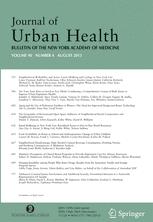Abstract:
Individual behavior and social contexts are critical determinants of health. We surveyed commissioners or their designees in 22 departments of health serving US cities of at least 500,000 people to examine their use of scientific approaches to influence individual behavior and social contexts. Each department used behavioral or social science in its work, but only four departments were indged to have integrated these approaches throughout their operations, using both centralized and decentralized structures. Degree of integration was unrelated to collaboration with universities or communities but was related to use of explicit theories. Behavioral and social sciences were employed most frequently in the areas of HIV/AIDS and maternal and child health and in the service of changing individual behavior rather than larger contexts, although across departments many health problems and approaches were involved. Commissioners generally found the approaches valuable, but articulated barriers to more widespread adoption.
Authors
- Amy Bleakley
- Neal L. Cohen
- Kathyrn Tannert Niang
- Sarah Perl
- Marybeth Shinn
- Nancy VanDevanter


